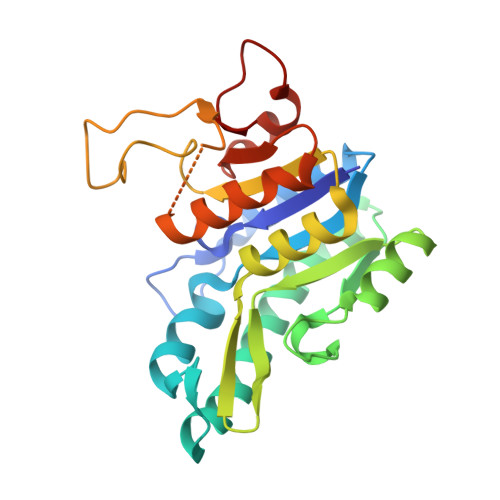X-ray structures of isopentenyl phosphate kinase.
Mabanglo, M.F., Schubert, H.L., Chen, M., Hill, C.P., Poulter, C.D.(2010) ACS Chem Biol 5: 517-527
- PubMed: 20402538
- DOI: https://doi.org/10.1021/cb100032g
- Primary Citation of Related Structures:
3LKK, 3LL5, 3LL9 - PubMed Abstract:
Isoprenoid compounds are ubiquitous in nature, participating in important biological phenomena such as signal transduction, aerobic cellular respiration, photosynthesis, insect communication, and many others. They are derived from the 5-carbon isoprenoid substrates isopentenyl diphosphate (IPP) and its isomer dimethylallyl diphosphate (DMAPP). In Archaea and Eukarya, these building blocks are synthesized via the mevalonate pathway. However, the genes required to convert mevalonate phosphate (MP) to IPP are missing in several species of Archaea. An enzyme with isopentenyl phosphate kinase (IPK) activity was recently discovered in Methanocaldococcus jannaschii (MJ), suggesting a departure from the classical sequence of converting MP to IPP. We have determined the high-resolution crystal structures of isopentenyl phosphate kinases in complex with both substrates and products from Thermoplasma acidophilum (THA), as well as the IPK from Methanothermobacter thermautotrophicus (MTH), by means of single-wavelength anomalous diffraction (SAD) and molecular replacement. A histidine residue (His50) in THA IPK makes a hydrogen bond with the terminal phosphates of IP and IPP, poising these molecules for phosphoryl transfer through an in-line geometry. Moreover, a lysine residue (Lys14) makes hydrogen bonds with nonbridging oxygen atoms at P(alpha) and P(gamma) and with the P(beta)-P(gamma) bridging oxygen atom in ATP. These interactions suggest a transition-state-stabilizing role for this residue. Lys14 is a part of a newly discovered "lysine triangle" catalytic motif in IPKs that also includes Lys5 and Lys205. Moreover, His50, Lys5, Lys14, and Lys205 are conserved in all IPKs and can therefore serve as fingerprints for identifying new homologues.
Organizational Affiliation:
Department of Chemistry, University of Utah, Salt Lake City, 84112, USA.
















